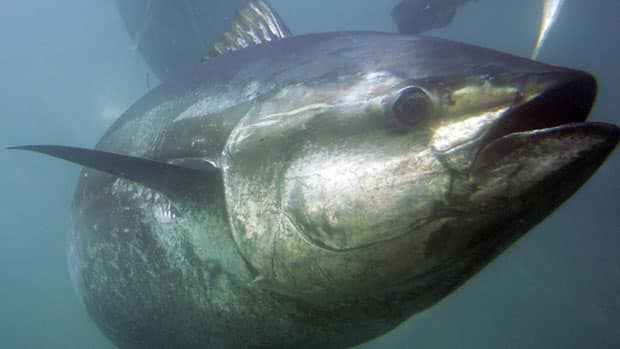Mi'kmaw fisheries manager, environmentalist appointed to international tuna quota agency

Canada has appointed a veteran Mi'kmaw fisheries manager to the international agency that sets quotas for commercial species of tuna and swordfish in the Atlantic.
Hubert Nicholas of Membertou First Nation was named as one of two commissioners representing Canadian interests at the International Commission for the Conservation of Atlantic Tunas (ICCAT) over the weekend.
He joins another recent appointee, environmentalist Katie Schleit of the non-profit conservation group Oceans North. Commissioners are appointed for two-year terms.
ICCAT is responsible for managing and protecting transboundary fish in the Atlantic. These are highly migratory, open ocean or pelagic species.
They include three species of tuna and swordfish collectively worth tens of millions of dollars to fishermen on the East Coast of Canada.
The international agency also imposes measures on member nations to protect non-targeted species like sharks.
Appointment praised
CBC News was unable to reach Nicholas on Monday.
Nicholas has served as director of First Fishermen Seafoods, an Indigenous-owned company based at Membertou. It has a fleet of 11 vessels harvesting groundfish, shellfish and open-ocean species including tuna.
He is now with Ulnooweg, a not-for-profit Indigenous development agency.
Troy Atkinson, a former Canadian ICCAT commissioner who represents tuna and swordfish fleets in Nova Scotia, praised Nicholas's appointment.
"He has knowledge of the fishery and was attached to commercial entities that both held a swordfish licence at one point in time and the bluefin [tuna] licence," Atkinson said.
'A vast change'
Shannon Arnold of the Halifax-based Ecology Action Centre called both appointments "a vast change."
"To me, it shows an openness to broaden the range of views in the management of fisheries. This is unheard of to have the First Nations community and the conservation community represented."
It is part of a shift in the Canadian delegation at ICCAT. Formerly, she said, commissioners were mandated to represent industry. Now they represent all stakeholders.
Atkinson is less supportive of an appointment from the ranks of Oceans North, a non-governmental organization (NGO) that has clashed with industry management of ICCAT fisheries.
"I don't see somebody from Oceans North as an industry commissioner. So I do have some difficulties with Katie," he said.
"We've had different views on where we should be going with both bluefin and swordfish and other things in the past, and I can't see how she's not going to do what she does for her group and is going to drop that in favour of commercial interests," he said.
'Wider sustainability considerations'
Both Schleit and Nicholas applied for the commissioner positions.
"I'm really pleased that my years of experience with fisheries management and policy, particularly with ICCAT, allowed me to be selected for this," Schleit said.
She told CBC News she pledges to work with industry, but also advance "wider sustainability considerations."
She also praised the newest commissioner.
"I'm really looking forward to working with Hubert in this role as well. He brings a lot of experience from the fishery, from a practical perspective, managing fisheries as well as from the policy side, and I think we'll work together well in this role."
Union objects to environmentalists
Tension recently flared in Newfoundland and Labrador over the increased participation of conservation organizations in the management of the capelin fishery.
Both the union representing harvesters and industry walked out of a meeting last month in Gander where environmental groups, including Oceans North, had been elevated from observer status to participants, giving them a bigger say in proceedings.
The Fish, Food, and Allied Workers Union (FFAW-Unifor) issued a statement calling them "uninformed, environmental extremists."
Oceans North called the union and industry behaviour at the meeting unacceptable.
MORE TOP STORIES

